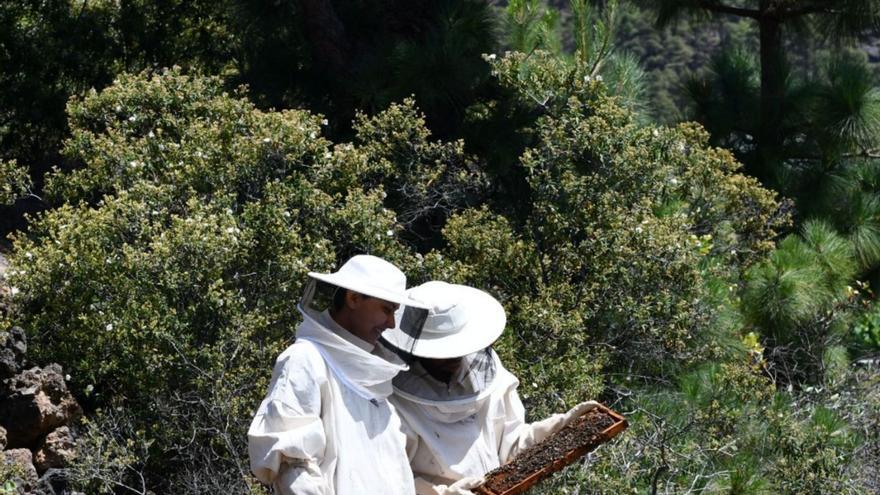
Tenerife heads, with more than 14,000 hives, a beekeeping farm that plays a crucial role in the balance of rural ecosystems. The quality of island honey is a treasure to be preserved in order to maintain the quality conditions that have led to the Protected Designation of Origin (PDO) seal.
The exciting world of beekeeping is a great unknown. Very few know that bees are cattle and form herds, just like pigs, cows or sheep. This primary subsector plays a crucial role in the ecosystem and in the sustainability of activities. In addition to contributing to the development of rural areas in which it has a presence due to the majority contribution of family businesses. The Island Ministry of Agriculture, Livestock and Fisheries maintains its support for producers with a subsidy line that reaches 92,000 euros this year. In order to preserve the quality of a product that is the basis for the Protected Designation of Origin (DOP), Honeys from Tenerife.
The insular subsidy is directed to the complementary feeding of the bees. It is aimed at beekeepers’ associations and aims to defray the costs for the acquisition of specific foods, rich in sugars, proteins and micronutrients (vitamins and minerals) that allow them to improve their nutritional status and thus contribute to preserving the bee population of Tenerife.
The island counselor, Javier Parrilla, explains that the objective is “Improve the productivity and health status of farms, as well as promote the maintenance of pollination of crops and wild plants by honey bees.” Parrilla emphasizes that supporting associations is essential for the protection of the general interest, “thanks to the pollinating role of bees”. He hopes to increase farm income. Parrilla stressed on Saturday, when opening the conference on honey in El Sauzal, “the importance of continuing on the path of promoting and protecting the beekeeping cabin and intensifying training to promote generational change.”
Lack of rain.
The counselor recalls that the lack of rain in recent years has caused a decrease in blooms, with poor quality nectar and pollen that has directly influenced the physical state of the bees. The lack of food and nutrients has caused weakness in the colonies, which poses a risk to the survival of the hives, even more vulnerable to disease. For this reason, Parrilla continues, “The Cabildo will maintain its support for beekeeping.” Also remember that the 2021 aid benefited a total of 581 beekeepers, which translates into some 14,284 hives in Tenerife.
Handmade and threatened.
Beekeeping in Tenerife is traditional in nature due to the steepness of the island. Apiaries are usually difficult to access and small in size, which makes an activity special that for many beekeepers constitutes an important complement to family income. The difficulties of settling hives, aging, marketing problems in new channels, external competition and fraud make beekeeping in Tenerife a threatened sector.
Quality.
Parrilla highlights “a rich and quality variety of honey, which is an added value to our gastronomy, in addition to the essential pollination work for crops.” That is why he understands that “we must value the production and maintenance of our cabin and protect it in the most difficult times.” It is the honey produced by honey bees, from the nectar of flowers or secretions of other parts of the plants that grow in the different ecosystems of the Island, in hives with mobile frames. Its processing is not subjected to heat treatments.
Conjunction.
The special characteristics of honey from Tenerife are due to the combination of climatology and orography of the areas where it is collected and the care and dedication of the beekeepers. On the one hand, the climatic variations between the north, with its humid environment, and the south, more arid. On the other hand, the highly varied volcanic soils. This conjunction creates a unique flora, which represents the raw material with which the bees make the excellent Tenerife honeys. Denomination of origin based on originality, diversity and contrast.
training sessions
The House of Honey, in El Sauzal, yesterday hosted the VI Technical Conference of the Association of Veterinary Specialists in Beekeeping (Avespa). In this framework, the quality and safety of beekeeping productions were discussed. Issues such as marketing or the importance of sensory analysis in the characterization of honey were also addressed in the forum. The professor at the University of Guelph (Canada), Ernesto Guzmán, spoke about bee populations resistant to varroosis, a disease caused by a mite that affects young and adult bees. | jdm















